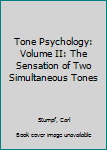Tone Psychology: Volume II: The Sensation of Two Simultaneous Tones
Carl Stumpf (1848-1936) was a German philosopher and psychologist and a visionary and important academic. During his lifetime, he ranked among the most prominent scientists of his time. Stumpf's intention, as evident in his book, Tone Psychology, was to investigate the phenomenon of tone sensation in order to understand the general psychic functions and processes underlying the perception of sound and music. It could be argued that modern music psychology has lost or perhaps ignored the epistemological basis that Carl Stumpf developed in his Tone Psychology. To gain a confident psychological basis, the relevance of Stumpf's deliberations on music psychology cannot be overestimated. Analyses of the essence of tones, complex tones and sounds are fundamental topics for general psychology and epistemology. By the end of this two volume work, Stumpf had established an epistemology of hearing. The subject of Volume I is the sensation of successive single tones. With almost mathematical stringency, Stumpf developed a topology of tones. Volume II deals with the sensation of two simultaneous tones, where different degrees of fusion can be heard depending on the interval. Tonal fusion is the tendency of consonant intervals to sound like an entity, whereas dissonant intervals do not fuse very much. But in spite of fusion of the two interval tones to a single interval sensation, both tones can be distinguished. This is easier for less consonant intervals than for highly consonant intervals, such as the octave. Thus, the degree of consonance corresponds to the degree of tonal fusion. All these investigations are complemented by vast discussions on the psychic and physical preconditions of tone and interval sensations, for example direct and indirect sensory judgements, application of indirect criterions, individuality of sense and memory, attention, practice, tiredness, measurability and reliability, the concept of infinity and steadiness of the tonal area, timbre, roughness, combination tones and so forth. The detailed descriptions of experiments, series of tests and test strategies show clearly that Stumpf was an excellent and pioneering methodologist and experimenter in the field of psychological tests. The books are stimulating, rewarding and provocative and will appeal to music psychologists, music theorists, general psychologists, philosophers, epistemologists and neuroscientists.
Format:Hardcover
Language:English
ISBN:1472435265
ISBN13:9781472435262
Release Date:January 2026
Publisher:Routledge
Length:326 Pages
Customer Reviews
0 rating





